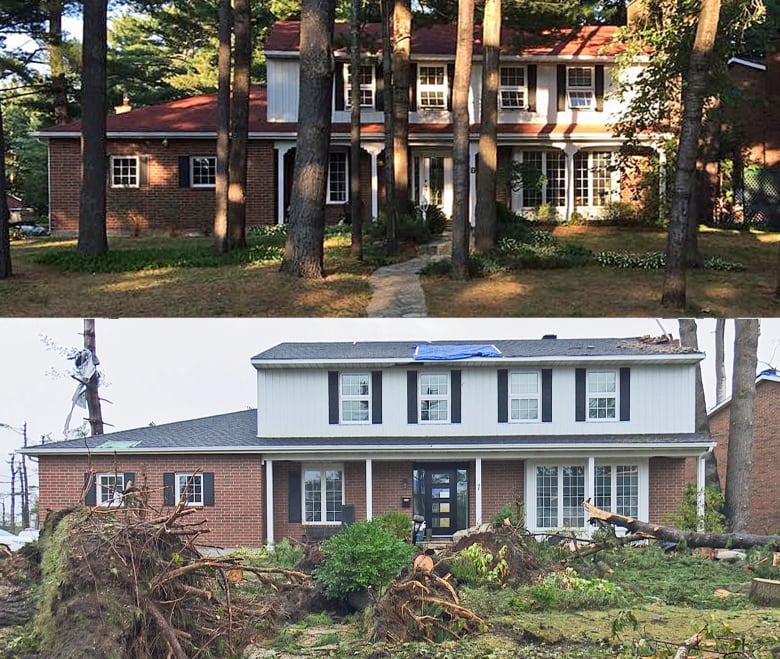'It's like a personal injury': Tornado takes emotional toll on Ottawa neighbourhood
Ottawa-area tornado has transformed Arlington Woods neighbourhood into a logging camp
The first thing that hits you when you arrive in the Ottawa neighbourhood of Arlington Woods is how it's been transformed — into a logging camp. Since the tornado touched down, there's no other way to describe it.
Giant trucks roll by full of logs. The only sound is the buzz of chainsaws. Everywhere it smells of freshly cut pine.
Arlington Woods used to be a kind of forest in the city. Hundreds of 150-foot white pines grew in the neighbourhood. The tornado ripped many of them out of the ground or snapped them like matchsticks.
The trees were what locals loved about their neighbourhood. During the Sept. 21 tornado, it was those same trees that destroyed many of their homes.
The National sent Nick Purdon and Leonardo Palleja to meet the people of Arlington Woods and find out how their neighbourhood has changed since the storm.
- WATCH: The National's story on Arlington Woods
- READ: Anatomy of a storm - revisiting the Ottawa-Gatineau tornadoes
Anne and Dave Bourgeau
It was "date night" when the tornado touched down in Anne and Dave Bourgeau's backyard.
Having ignored the warnings about the storm, the couple was in the kitchen making dinner.
"Everything started to shake," says Dave says. "That's when I grabbed Anne. We went into the back room and then all the windows blew out onto us on the couch. We were yelling and trying to hang on to each other."
"Glass was just shooting at us," Anne adds. "And we were both screaming like children."
Ten seconds later the storm was over. And when the couple stepped outside, all 25 of the giant white pines that grew in their backyard were in pieces.
"It was like a war zone," Anne says.
The couple believes they are lucky to be alive.
When asked what kind of week it has been, Anne raises her eyebrows and then laughs.
"Can I swear now?" she says. "A shitty one."
Maybe the best way to understand what kind of week it's been is to look at Anne's phone. She stares at a picture of what her house used to look like.

Linda Cruz
Linda Cruz has lived on Parkland Crescent for 14 years, but she's going to have to move — at least for a while. The tornado snapped the huge tree that grew in her backyard and dropped it onto her roof.
"The tree was so heavy that it just kept sinking into the house," says Cruz. "I came back the next day and it was getting lower and lower."
The white pine, which Cruz estimates weighed several tonnes, crushed her bathroom and caved in the ceiling of her bedroom. A structural engineer will decide whether her entire second floor will have to be replaced.
All Cruz knows for certain is that she won't be able to live in her home for at least six months.
She's only half joking when she says that the smell of freshly cut pine might be something that triggers PTSD in her future.
Jim Lahey
Most people in Arlington Woods need some kind of help.
Then there's Jim Lahey, 71.
Somehow Lahey's house on Emery Court was untouched, so he drives around the neighbourhood with a trunk full of sandwiches and coffee looking for people to help.
In this video, he takes the CBC News crew on a drive around the neighbourhood for a view of the damage and the work that tree-cutting crews are doing to clear the fallen wood:
"It's what you do. It's just what you do," says Lahey. "I just thought, I have to get out of the house. Can't sit in the house when this is going on."
Lahey, a retired dentist, raised his kids in the close-knit neighbourhood. He surveys the wreckage and muses that he and his family have had Christmas or Thanksgiving dinners in many of the damaged homes.
In this video, Lahey describes to CBC's Nick Purdon how the community has been affected by the tornado:
"You know, it's like a personal injury," says Lahey. "This community has been hurt badly enough that everybody who lives here feels bad, and they feel bad for each other."
Since the storm, life in Arlington Woods has moved outside. People walk the streets staring at the fallen trees and broken houses.
"There's a lot of people walking with no expression," Lahey says. "They're traumatized."
Luzia Veiga
Luzia Veiga says she'll never forget the 265-kilometre-per-hour winds she could hear as she cowered in the basement of her house.
"It's like a train coming at you. It's very terrifying," she says. "You think that death is coming close to you. You are running away from death."
Veiga says that since the storm, she's been drawn to her backyard where she marvels at the power of the tornado and the randomness of the destruction.
She points to a small statue in her backyard that stands unscathed.
"When it gets you, it gets you," she says, referring to fate. "When it hits you they don't ask for permission — it's your time."
Veiga, a social worker and part-time opera singer, says she has committed to living her life with more passion since surviving the storm.
"I was so close to something so dangerous that you could lose your life — if it blew down a tree like it did, it could have taken me as well," she says.
"I'm really, really happy. And I am glad that nobody is dead — this is the main thing. Yeah, a life you cannot bring it back, but things can be rebuilt."



